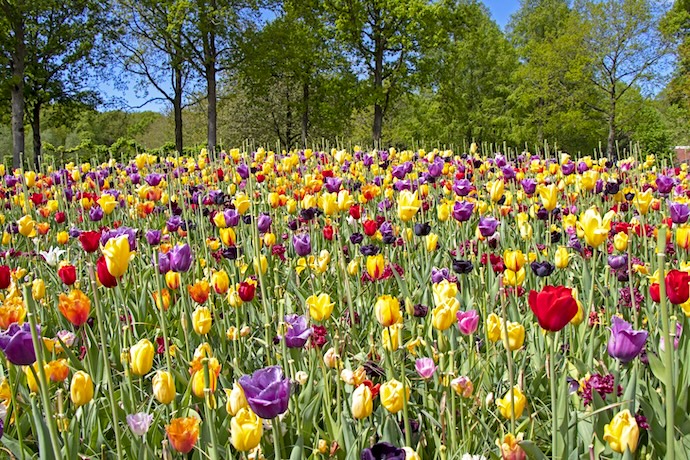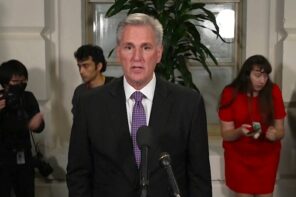Sunday was Transgender Day of Visibility; it was also Easter, a holy day for many people. This incidental confluence (Transgender Day of Visibility is always on March 31, and Easter just happened to fall on that date this year), gave rise to paranoid right-wing conspiracy theories about a provocative transgender desecration of the Christian holiday. But for me personally, the day offered occasion to reflect upon the spiritual dimensions of my experience as a trans person who’s recently begun a gender transition with the assistance of gender-affirming hormone therapy at a time in which this treatment—and trans existence itself—has become hotly politicized.
The connection between gender—specifically trans identities—and the sacred, has always been present for me. Before I saw my true gender on my physical body as anything other than a glint in my eyes, I felt it as a hum. I felt this more directly as a very young child, and then its pulse grew fainter for years, before strengthening again in early adulthood. There is much hatred directed at trans people, and I’d be lying if I said it didn’t get to me, but it doesn’t get to me all the way, because I can see the hum for what it is, and I know its goodness, and I can feel how unassuming, guileless, lucid, and free it is.
I don’t think this is unique to trans experiences: What I’m sensing is, in part, simply the desire for something to exist as it is. For a tulip, say, to be a tulip. Or a velociraptor to be a fierce little bitey velociraptor. You don’t go walking around a garden, stomping on tulips because they aren’t hyacinths. You don’t tell a velociraptor to be a frog. You just trust the unique pulse and flow of its life, and the beauty of that. If you’re a gardener, you give each flower the water and light they need, and you appreciate them for what they are.
Before I saw my gender on my body—even the slight trace now visible—I saw it in sand moving in the wind. I even told myself—maybe to avoid saying “female” before I was ready to do so—that my gender was simply “wind.” It was invisible, but it was a force on the move: You could hear it, feel it, know that it was real.
I’ve often sensed my trans identity most palpably in the more-than-human world. It’s partially just being away from the social buzz of people, who have throughout my life perceived me as male, which creates noise in my brain. But in addition to the quiet of my escape from humans, being “in nature” has also brought me a sense of self-understanding through an awareness of my interconnection with the web of life. People often focus heavily on the “social” aspect of gender, by which they almost always mean the human world. But I see my trans identity as ecological, because it’s within this widest expanse of diverse life that it’s been most clear to me.
When I went by myself last winter to Puerto Rico’s El Yunque rainforest, for example, I spent a day in which I saw almost no one, and I sat for a very long time at the base of a waterfall, surrounded by mountains and a sea of green. As I was agonizing over what to do with my gender, I had a profound moment of clarity and quiet in which, by feeling myself as part of the ecosystem around me, I was able to sense myself as I am, to feel my transness, and to honor and care for this aspect of myself with the seriousness and fidelity it deserves.
In moments like these, I see that the hum is me, and I see this as it links up with the more-than-human-world around me, creating a resonance that makes sense. It calls to mind Kurt Cobain’s lyrics in “All Apologies:” “In the sun I feel as one…all in all is all we are.”
It’s an experience of wholeness, in other words, that’s made particularly clear by contrast, because I’ve been so fractured much of my life. And it’s not only wholeness within myself: It’s the realization that this hum doesn’t begin with me, but rather moves through me—like wind—and I can only really come into contact with the world around me when I allow this to happen.
To me, that’s what “the sacred” is, most poignantly: It is the fact that our deepest inner beings are enmeshed in an embrace with the broader fabric that stretches across time and distance. It’s the paradox of finding your home precisely in the flux of change and transformation, and of looking and recognizing—again and again in myriad forms—that which is true and known-to-self inside of that which is startlingly new and other. It’s the bravery it takes to even begin to step into this: to leave the shore of belief in an act of surrender that gives no explicit, logical promise of security. Whenever I see the word “heaven” nowadays, I think of the word “heaving,” as in, effort, as in lifting, as in vomiting, as in, mostly, the thing that seas do, which you cannot control.
That’s why transphobia seems to me, among other things, a spiritual offense, one so often committed by petty zealots in the name of religion. In an immediate material sense, transphobia is dangerous—to me and my family, and to the millions of other trans people in the world. It is also a pointless squandering of a precious gift that life has given us: Transness is an expression of life’s restless creativity, of its explosive beauty, of its enriching diversity, of its mystery and, possibly, its love.
Trump and MAGA and the transphobes, obviously, are not capable of holding this truth, and have therefore fallen into a spasm of self-righteous panic over this year’s coincidental Trans Day of Visibility/Easter overlap. In a post on X, Speaker Mike Johnson falsely declared that President Biden is “banning sacred truth and tradition” while proclaiming March 31 “Transgender Day” (sic), and that with this “abhorrent” action Biden has supposedly “betrayed the central tenet of Easter.”
Beyond the fact that Biden neither prohibited any traditional Easter activities nor set the date for Trans Day of Visibility, which has been held on March 31 for the past 15 years, the most important and overlooked truth here is that trans people have existed as part of the human family in every culture for as long as our species has been on this earth. The fact that Johnson and his ilk, in their ignorance and easy piety, believe that trans people pose some new and urgent threat to their spiritual values is an act of breathtaking hypocrisy.
Indeed, over the past few years, the Right has intensified its rhetorical and legislative attacks against transgender people to a fever pitch, introducing (and often successfully passing) many hundreds of bills each year in legislatures that aim to strip trans people of legal recognition, of life-saving health care, of the right to be out as a teacher (and not to be outed as a student), of the right, generally, to exist within and be safe in society. It’s an institutional attempt to enact what Daily Wire contributor Michael Knowles called for at last year’s CPAC: “The eradication of transgenderism (sic) from the public sphere.” As his own attempt at a work-around from the genocidal ring of this call, Knowles has also remarked: “I don’t know how you could have a genocide against transgender people…they are not a legitimate category of being.”
The results of this hatred have been devastating on multiple fronts, and the rate of trans people who have attempted suicide has risen to a staggering 42%. Rather than recognize that the moral course of action would be to reverse this crisis, many on the Right—and some on the Left—are doing whatever they can to make it even more agonizing and deadly.
Transitioning in the midst of this cruel political climate has often felt like walking into a house on fire. But it also feels like coming home. And something I’ve noticed over the past few months as I’ve begun my transition is that I am most certainly not the only one transitioning during this difficult time. Many other trans people have, despite the fearsome headwinds, embarked on their own transition journeys, motivated by the shared human instinct to connect with who they really are.
I am no longer a Christian, and for the past 20 years Easter to me has meant, mostly, chocolate. But the central tenets of my own spiritual system guide me to celebrate the human quest for authenticity and connection, however each of us may find it. And it has motivated me to work towards a society in which people are supported and loved as they look within themselves for the points of harmony that would make them able to emerge into the world as their fullest, happiest, most vibrant selves.





